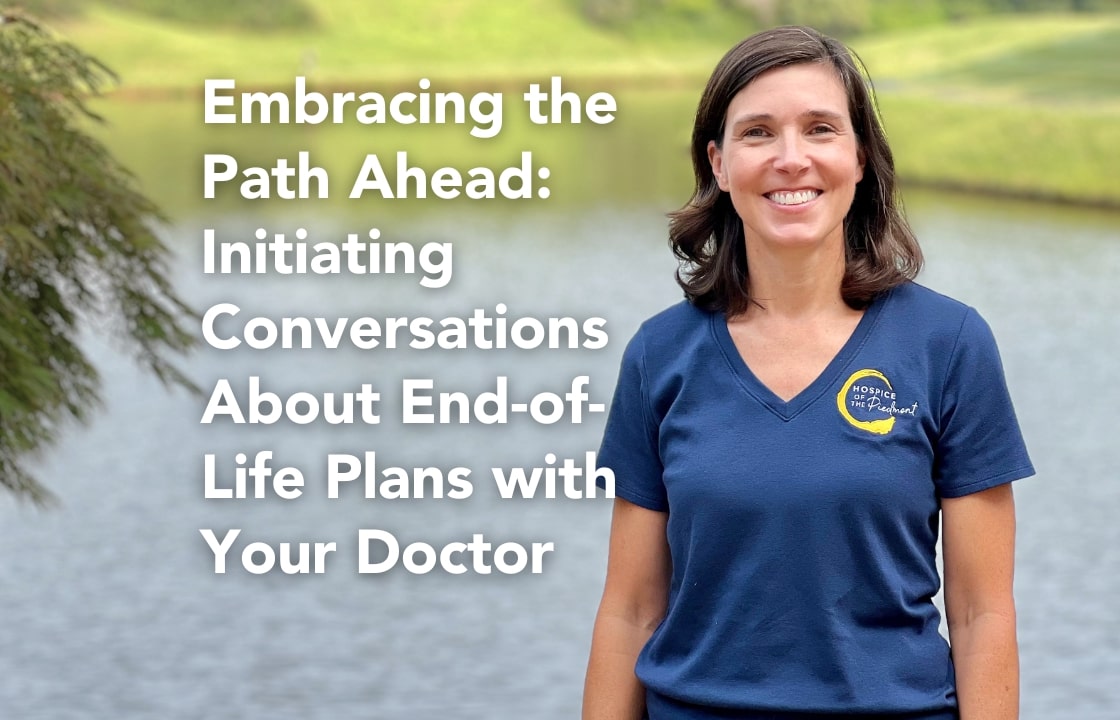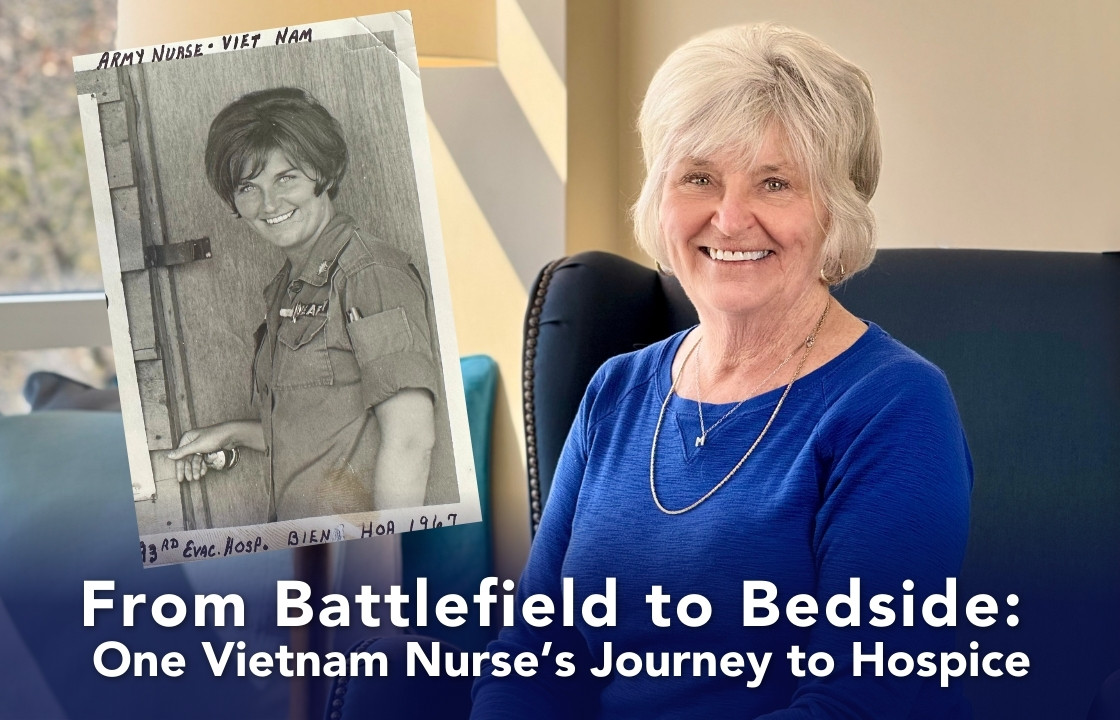At Hospice of the Piedmont, we see the powerful benefits of thinking ahead about end-of-life plans. But we also know how uncommon and challenging those discussions can be.
According to a survey HOP conducted last year, while more than 80% of people said engaging in end-of-life planning was necessary, the majority (63%) said they wanted someone else to start that conversation. When asked who should initiate conversations about end-of-life plans, one typical response (24%) was a doctor.
Instead of waiting for your doctor to start the discussion, we encourage you to initiate these crucial conversations proactively. To help understand how to approach that exchange, we turned to our Education Director, Mina Ford, a nurse with over two decades of experience and a master’s in nursing.
“Patients assume that their physician will tell them things they want to know,” says HOP’s Director of Education, Mina Ford. “In reality, physicians don’t always realize what their patients want to know. So, it is important to ask questions so they can provide you with the information you feel is important to understand.”
Engaging in discussions about this phase with your doctor can feel overwhelming, but it can also be an empowering step. This guide provides insights on approaching these conversations, whether you’ve recently received a terminal diagnosis or are simply considering the future. Our aim is to help you navigate these discussions with care, empathy, and thoughtful consideration.
The Importance of Addressing End-of-Life Planning?
While discussing the end of life can be challenging, having this conversation with your doctor can bring immense comfort and clarity. This is an opportunity to understand your options, reflect on your values, and ensure your wishes are honored in the years to come. These discussions can empower you to take charge of your healthcare journey and find peace of mind knowing you’re making informed choices.
Preparing Yourself: Reflecting on Your Values and Wishes
Before you sit down with your doctor to discuss your end-of-life plans, take some time to reflect on your own values and wishes. This introspection can help guide your conversation and ensure you make decisions that align with what truly matters to you.
“Write down your questions before your doctor’s visit. Understanding what you truly want out of life and what is most important to you helps your medical team provide care that matches your wishes,” says Ford.
Here are some questions to consider:
- What Brings You Joy: Reflect on the activities, people, and places that bring you the most joy and comfort. How can you incorporate these elements into your end-of-life plans to ensure a sense of fulfillment and happiness?
- What Concerns You: Similarly, this is also your opportunity to share your anxieties. “It’s perfectly normal to feel anxious about this conversation,” says Ford. “I always tell people to start with whatever worries them the most or is the biggest concern. What information do you need to help you plan?” Explaining your most pressing concerns to your physician helps them plan your care and understand when it may be time to change directions.
- Goals and Regrets: Are there goals you still want to accomplish or regrets you wish to address? Consider what you want to achieve or resolve in the time you have left.
- Quality of Life: Think about the life you want to lead in your remaining time. What level of comfort, independence, and engagement is important to you? How do you envision your day-to-day life? Share with your physician what you define as a good quality of life. Discuss what options are available when your quality of life is declining.
- End-of-Life Preferences: How do you envision your final days? Where do you want to be? Who do you want to be surrounded by? What kind of atmosphere do you want to create?
Organizations like The Conversation Project and Compassion & Choices offer free downloadable guides with even more questions to help you organize your thoughts.
Initiating the Conversation: When and How to Reach Out
Approaching the topic of end-of-life plans with your doctor might feel daunting, but the timing and approach can significantly impact the outcome of the conversation.
Here are some guidelines to help you initiate the discussion:
Choosing the Right Moment: Finding a suitable time to have this conversation is important. While regular appointments are generally efficient for discussing healthcare updates, consider scheduling a separate appointment to focus solely on end-of-life matters. This allows both you and your doctor to fully engage without feeling rushed. After all, this is a benefit you’ve earned; Medicare will reimburse your physician for a 30-minute advanced care planning appointment.
Bringing a Friend or Family Member: Having a trusted friend or family member present during the conversation can provide emotional support and help you remember important details. “Having a difficult discussion can be overwhelming, and sometimes it may be hard to remember the information that the physician provided. Having someone with you to write things down or as a second set of ears can be useful. I remember multiple times being in a room where a physician explained things, and afterward, the patient did not recall what was said,” explains Ford.
Breaking the Ice: Starting the conversation might feel uncomfortable, so think about how you’ll begin. You can say, “I’ve been thinking about my future and my health. Is it possible for us to discuss my end-of-life plans and what to expect?” This approach signals your openness to the dialogue while allowing your doctor to guide the discussion.
Sharing Your Reflections: Begin by sharing the insights gained from reflecting on your values, goals, fears, and preferences, as mentioned earlier. This sets the stage for a comprehensive discussion and helps your doctor understand your priorities.
Covering Key Questions with Your Doctor
If you feel intimidated about asking your doctor questions about your prognosis, remember that your doctor is there to support and guide you. It’s okay to express your feelings of uncertainty or fear. Take a deep breath, remind yourself that your concerns are valid, and you’ll need this information to make informed decisions about your care.
To guide your conversation, consider asking your doctor the following questions:
- Understanding Your Prognosis: It’s natural to have questions about what lies ahead. Don’t hesitate to ask your doctor about your prognosis. Questions like “What can I expect in the coming days, weeks, months, or years?” can give you a clearer understanding of your path. It’s also important to understand expectations for longevity by asking questions like, “Based on your expertise, what is my projected life expectancy? What factors influence this projection?”
- Treatment Options: Even if your doctor presents only one option for treatment, be sure to ask about alternatives. “There’s often more than one choice,” says Ford. Inquire about the benefits and risks of each option. Understand potential side effects and how they might affect your quality of life and ability to function independently. “In some cases, you may have two options, and your quality of life may be different based on the different options,” says Ford.
- Curable vs. Treatable: If you’ve recently received a new diagnosis, try to get clarity on whether or not the disease is curable. Ask, “What is the likelihood of a cure for my condition?” Or, if a cure isn’t feasible, “What are the goals of treatment?” Additionally, although some doctors would want hospice care if they were in your situation, they may be reluctant to suggest it. So, you may need to bring it up. “Considering my current situation, I’m wondering if hospice care might be a better option for me. What are your thoughts?”
- Quality of Life: Your well-being and comfort matter. Discuss how each treatment option might impact your day-to-day life. Ask questions such as “How will each treatment option affect my quality of life?” and “How will it affect my ability to do things on my own?” This is also an excellent time to inquire specifically about palliative medicine, which focuses on managing symptoms and easing discomfort.
- Care Settings: Recognize that, over time, each of us may require additional help performing the regular activities of daily living. Now is the time to anticipate and plan. Asking questions like, “As my condition progresses, what kind of care settings should I be prepared to consider?” and, “Are there specific resources or facilities you would recommend?” can help you prepare.
- Making Informed Decisions: As you contemplate various treatment paths, it’s essential to make informed decisions aligned with your values. Engage in a conversation about what truly matters to you. Ask your doctor about the likely physical, mental, and emotional changes you might experience as your disease progresses.
- Listen and Ask Questions: Your doctor will likely ask questions to understand your wishes better. Listen carefully to their insights and recommendations. Don’t hesitate to ask questions if you need clarification or want to explore different options. Remember, this is a collaborative effort to create a plan that aligns with your values.
Taking Control: Embracing End-of-Life Conversations
End-of-life conversations can feel overwhelming, yet they offer a powerful opportunity to make choices reflecting your values. As you talk to your doctor, keep these points in mind:
- Take Your Time: These conversations are not one-size-fits-all. Take the time you need to understand your options and make decisions that feel right for you.
- Stay Informed: Knowledge is key. Research and ask questions so you can make informed decisions about your care.
- Advocate for Yourself: Your voice matters. If there’s something you’re uncertain about or if you have concerns, don’t hesitate to speak up and ask your doctor for clarity.
- Revisit and Adjust: End-of-life plans are not set in stone. Your feelings and priorities might evolve over time. Revisit your decisions with your doctor as needed and make adjustments that reflect your current wishes.
Finding Peace and Empowerment
Navigating end-of-life conversations with your doctor is about finding peace in knowing that you’re making choices that resonate with your values and wishes. It’s an opportunity to ensure that your journey is as comfortable and meaningful as possible. Remember that you’re not alone—your doctor, loved ones, and a network of support are here to walk this path with you.
As you embark on these conversations, approach them with an open heart and a willingness to express your thoughts and feelings. By doing so, you’re taking a powerful step toward embracing the path ahead on your own terms, with the care and dignity you deserve.
“The main thing is to start the conversation,” says Ford.
—–
If you’re ready to learn more about your options for hospice care or palliative medicine, we’re here to help. You can begin the conversation with us using this confidential online form.



